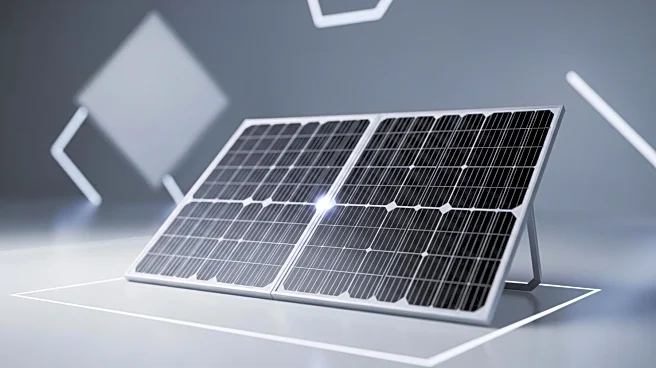What is the story about?
What's Happening?
Two prominent European solar trade organizations, the European Solar Manufacturing Council (ESMC) and SolarPower Europe (SPE), have intensified their efforts to secure greater support for solar manufacturing within the European Union. This initiative comes in the wake of challenges faced by European firms attempting to capitalize on both the EU's Net Zero Act and the U.S. Inflation Reduction Act (IRA). Many companies, including Meyer Burger, have struggled to establish a foothold in the U.S. market post-Trump presidency, leading to a reassessment of strategies. The trade bodies have issued a joint letter to the European Commission and the Competitiveness Council, urging for additional measures beyond the existing Net Zero Industry Act to bolster the solar sector.
Why It's Important?
The call for increased support highlights the competitive pressures faced by European solar manufacturers, particularly in comparison to markets like India and China, where production costs are lower. The success of solar manufacturing in Europe is crucial for achieving the EU's climate goals and maintaining technological leadership in renewable energy. Failure to provide adequate support could result in a loss of market share and innovation capacity, impacting the EU's ability to meet its sustainability targets. The advocacy by ESMC and SPE underscores the need for strategic policy interventions to ensure the viability and growth of the solar industry in Europe.
What's Next?
The upcoming solar PV ministerial meeting on September 30, 2025, will be a critical juncture for discussing potential policy enhancements. Stakeholders, including government officials and industry leaders, are expected to deliberate on the proposed measures to strengthen the solar manufacturing sector. The outcome of these discussions could shape the future trajectory of solar energy development in Europe, influencing investment decisions and international competitiveness. The response from the European Commission and member states will be pivotal in determining the level of support and resources allocated to the solar industry.
Beyond the Headlines
The broader implications of this advocacy effort extend to the geopolitical landscape of renewable energy. Strengthening solar manufacturing in Europe could reduce dependency on imports from countries with lower production costs, thereby enhancing energy security. Additionally, fostering a robust solar industry aligns with ethical considerations of sustainable development and environmental stewardship. The push for increased support also reflects a cultural shift towards prioritizing green technologies and innovation as central components of economic growth.















